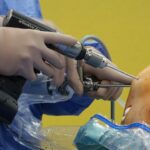Sports injuries can happen to anyone. While some injuries can heal with rest and self-care, others require professional attention to prevent long-term complications. So, how do you know when it’s time to see a specialist?
Check the following key signs that your sports injury may need expert care and how sports medicine specialists can help get you back in action.
Common Signs Your Injury Needs a Specialist
Sports injuries range from minor sprains to severe ligament tears. It’s crucial to recognise when an injury goes beyond something you can handle on your own. Here are some red flags:
1. Persistent Pain
Pain that lingers for days or weeks, even with rest, could indicate a more serious issue like a ligament tear, stress fracture, or cartilage damage. Don’t ignore ongoing discomfort.
2. Swelling That Won’t Go Down
While minor swelling is normal, persistent or worsening swelling could mean internal damage, such as a torn ACL or a meniscus injury.
3. Limited Range of Motion
If you find it hard to move the affected joint or limb without pain, it could be a sign of structural damage or joint instability that needs medical attention.
4. Joint Instability
Feeling like your knee, ankle, or shoulder might give out during movement is a common symptom of ligament damage.
5. Numbness or Tingling
These sensations, especially in the hands, arms, or legs, could indicate nerve involvement or a serious injury like a herniated disc.
6. Visible Deformity
If a joint looks out of place or there’s a noticeable bulge, it could mean a dislocation or a fracture that requires immediate care.
7. Injuries That Don’t Improve
If you’ve tried rest, ice, compression, and elevation (R.I.C.E.) but aren’t seeing progress after a few days, it’s time to consult a specialist.
How Sports Medicine Specialists Can Help
Sports medicine specialists are trained to diagnose and treat various injuries. Here’s what they can do for you:
1. Comprehensive Diagnosis
Specialists use advanced imaging techniques like X-rays, MRIs, and ultrasounds to diagnose your injury and its severity accurately.
2. Tailored Treatment Plans
Based on your diagnosis, they’ll create a personalised plan that may include:
- Physical Therapy – To restore strength and mobility.
- Medications – To manage pain and inflammation.
- Injections – Such as corticosteroids or Platelet-Rich Plasma (PRP) to promote healing.
3. Surgical Expertise
For severe injuries like ACL tears or cartilage damage, specialists can perform minimally invasive surgeries to repair the damage and speed up recovery.
4. Rehabilitation Support
They’ll guide you through recovery, ensuring you regain full function while minimising the risk of re-injury.
When to Seek Immediate Care
In some cases, waiting to see a specialist could worsen your injury. Seek immediate care if:
- The pain is unbearable.
- You cannot bear weight on a limb.
- There’s excessive bleeding or a deep wound.
- A joint is visibly dislocated.
Preventing Future Injuries
Once you’re on the road to recovery, it’s essential to take steps to prevent future injuries:
- Strength Training – Build muscle to support your joints.
- Proper Warm-Up and Cool-Down – Prepare your body for activity and aid recovery afterwards.
- Use the Right Gear – Invest in supportive footwear and protective equipment.
- Listen to Your Body – Don’t push through pain; rest when needed.
Contact An Orthopaedic Clinic Now
Knowing when to see a specialist can make all the difference in your recovery. Ignoring persistent pain or swelling may lead to chronic issues that limit mobility and performance.
At Liberty Orthopaedic Clinic, our team of sports medicine specialists is here to help you recover safely and get back to doing what you love. Whether it’s a minor sprain or a more serious injury, we’re committed to providing personalised care to meet your needs.
Don’t let an injury hold you back—schedule a consultation with us today. Your health and mobility are worth it!










